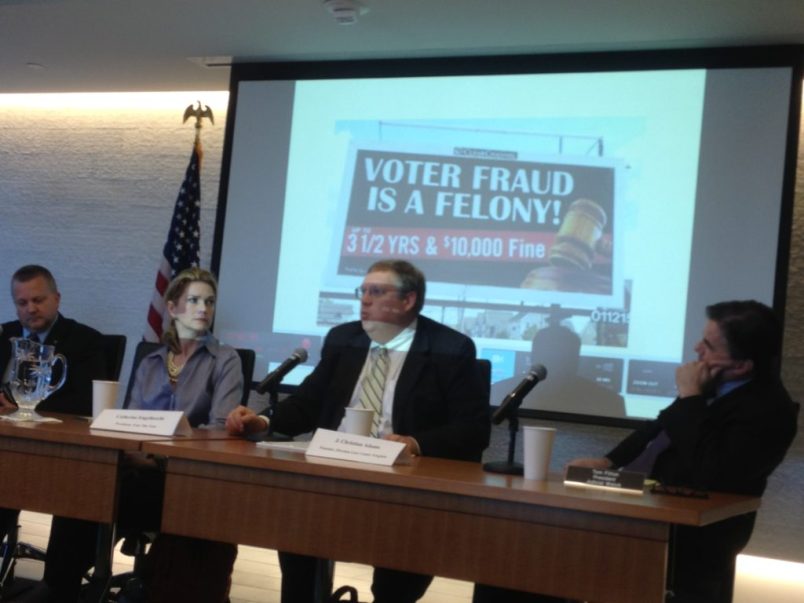ALEXANDRIA, VA — J. Christian Adams — a former member of President Trump’s voter fraud commission who has been sued for defamation for his reports claiming mass fraud — will have to sit for another deposition in the case, after a last-minute discovery dump raised new questions about how the reports came together.
U.S. Magistrate Judge Ivan Davis said at a hearing Friday that he was granting the plaintiffs’ request to reopen the deposition. He said the topics should be limited to the materials —some 1,000 pages of documents — that were turned over after Adams had initially been deposed. He declined Adam’s attorney’s request to narrow the deposition any farther than that, pointing to procedural rules designed to help parties avoid and deal with any disagreements within a deposition.
“That’s how the process works,” Davis sternly told Adams’ attorney, noting that the court does not have an “extrasensory” perception of what issues may arise during a deposition.
Adams and his group the Public Legal Interest Foundation were sued over reports released in 2016 and 2017 called Alien Invasion and Alien Invasion II, respectively. The reports alleged that thousands of noncitizens had been removed from Virginia’s voter rolls and included voting records, which showed the alleged noncitizens’ personal information such as addresses, birthdays and social security numbers. The lawsuit, which also alleges voter intimidation, was brought by people named in the report who were in fact citizens, as well as by the Richmond Chapter of the League of United Latin American Citizens.
To argue for reopening the deposition, the plaintiffs in a filing last week pointed to an email from a volunteer who helped Adams assemble the report. In it, the volunteer Steven Albertson referenced a 10-15 percent rate of people they identified as noncitizens who were actually citizens eventually re-instated on the rolls. Albertson said in a deposition that the source of that estimate was likely Adams — a claim Adams denies.
The plaintiffs also pointed to an email exchange — turned over the hour before the discovery deadline — that Adams had with other conservative activists including Ginni Thomas, the wife of Supreme Court Justice Clarence Thomas.
Adams’ attorneys in a filing Wednesday suggested that the exchange was made public by the plaintiffs in an effort to “silence and smear” anti-voter fraud advocates. The filing called out TPM by name for reporting on the Thomas emails. The emails came up only briefly at Friday’s hearing. The plaintiffs, represented on Friday by Zachery Martin, defended their inclusion of the emails in their filing because in them, Adams discussed the same Voting Rights Act voter intimidation provision he is now accused of violating.
Adams was not present at Friday’s hearing.
Davis was visibly impatient with many of the arguments put forward by Adams’ attorney, Michael Lockerby, as to why the deposition should not be re-opened.
As Lockerby tried to explain why the documents put forward by the plaintiffs weren’t relevant, Davis told him, “I don’t care.”
“To discuss four out of 1,000 [pages] is not going to persuade this court,” the judge said.
When Lockerby claimed that, “if anyone was surprised” by the current situation, “it was us,” Davis pushed back and explained the position that the last minute discovery had put the plaintiffs in.
“That’s surprise,” the judge said.
Davis refused to limit the deposition to less than a full day. He also declined to limit it to just the email exchanges involving Adams. He said it would be fair game that Adams be deposed about any hypothetical discussion between two other people that said they knew he was lying.
However, Davis also showed some skepticism towards the plaintiffs and particularly towards their claim that PILF’s fundraising was relevant to their case. Breaking down how PILF raises money could be a “waste of everybody’s time” the judge said.
“I don’t want a whole bunch of phone calls in chambers because parties can’t agree what’s relevant or not,” Davis warned.
The case is currently set to go to trial in September. At the end of Friday’s hearing. Davis asked the parties if they had started discussing a potential settlement. Lockerby said they were working on scheduling a settlement conference.






